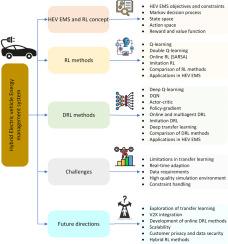Reinforcement learning-based energy management for hybrid electric vehicles: A comprehensive up-to-date review on methods, challenges, and research gaps
IF 9.6
Q1 COMPUTER SCIENCE, ARTIFICIAL INTELLIGENCE
引用次数: 0
Abstract
Reinforcement learning is widely used for control applications and has also been successfully implemented for efficient energy management within hybrid electric vehicles. Reinforcement learning algorithms offer various advantages, including fast convergence, broad applicability, stability, and robustness, particularly with the integration of deep and transfer learning. This paper provides a comprehensive understanding of reinforcement learning principles and a critical review of various reinforcement learning methods, states, actions, and rewards used to optimize the energy management performance of hybrid electric vehicles. Furthermore, the advantages and limitations of these algorithms are also discussed. This review reveals that deep reinforcement learning techniques show superior performance in handling complex energy management tasks thanks to their ability to learn from high-dimensional state spaces. Nevertheless, their implementation faces notable obstacles, including computational complexity and generalization across diverse driving conditions. Finally, key research directions for future work and challenges are highlighted in the domain of reinforcement-learning-based hybrid electric vehicle energy management.

基于强化学习的混合动力汽车能量管理:对方法、挑战和研究差距的全面最新综述
强化学习广泛应用于控制应用,并已成功应用于混合动力汽车的高效能源管理。强化学习算法具有多种优势,包括快速收敛、广泛适用性、稳定性和鲁棒性,特别是深度学习和迁移学习的集成。本文提供了对强化学习原理的全面理解,并对用于优化混合动力电动汽车能量管理性能的各种强化学习方法、状态、动作和奖励进行了批判性回顾。此外,还讨论了这些算法的优点和局限性。这篇综述揭示了深度强化学习技术在处理复杂的能量管理任务方面表现出优异的性能,这要归功于它们从高维状态空间中学习的能力。然而,它们的实现面临着明显的障碍,包括计算复杂性和在不同驾驶条件下的泛化。最后,提出了基于强化学习的混合动力汽车能量管理领域未来工作的重点研究方向和面临的挑战。
本文章由计算机程序翻译,如有差异,请以英文原文为准。
求助全文
约1分钟内获得全文
求助全文
来源期刊

Energy and AI
Engineering-Engineering (miscellaneous)
CiteScore
16.50
自引率
0.00%
发文量
64
审稿时长
56 days
 求助内容:
求助内容: 应助结果提醒方式:
应助结果提醒方式:


